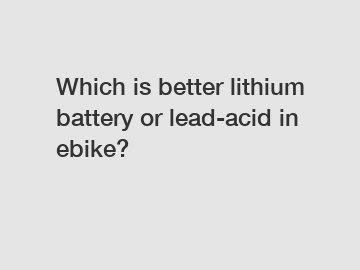Which is better lithium battery or lead-acid in ebike?
The debate over whether lithium batteries or lead-acid batteries are better for e-bikes has been a topic of discussion among electric bike enthusiasts for quite some time. Both types of batteries have their own set of advantages and disadvantages, making it difficult for consumers to determine which one is best suited for their needs. In this article, we will compare the two types of batteries to help you make an informed decision when choosing the right power source for your e-bike.
Cost.
When it comes to cost, lead-acid batteries are generally cheaper upfront compared to lithium batteries. This can be appealing to consumers on a budget who are looking for a more affordable option. However, it's essential to consider the long-term costs associated with lead-acid batteries, as they have a shorter lifespan and may need to be replaced more frequently than lithium batteries. On the other hand, lithium batteries tend to have a higher upfront cost but can last longer, thereby potentially saving you money in the long run.

Performance.
In terms of performance, lithium batteries have the upper hand. They are lighter in weight, have a higher energy density, and can provide more power to the motor, resulting in better overall performance of the e-bike. Lithium batteries also have a longer lifespan and can withstand more charge cycles compared to lead-acid batteries. This means that you can ride your e-bike for more extended periods without worrying about running out of power.
Charging Time.
Lithium batteries have a faster charging time compared to lead-acid batteries. This means that you can recharge your e-bike more quickly and get back on the road sooner. With advancements in technology, some lithium batteries can be charged up to 80% in just an hour, making them a convenient option for those who are always on the go. Lead-acid batteries, on the other hand, have a slower charging time and may take several hours to reach full capacity.
Environmental Impact.
One aspect that sets lithium batteries apart from lead-acid batteries is their environmental impact. Lithium batteries are more eco-friendly as they contain fewer toxic chemicals compared to lead-acid batteries. Additionally, lithium batteries are more energy-efficient and have a higher energy density, making them a cleaner and greener option for e-bike users who are conscious of their environmental footprint.
Conclusion.
In conclusion, both lithium batteries and lead-acid batteries have their own set of pros and cons. The choice between the two ultimately comes down to your specific needs and preferences. If you're looking for better performance, longer lifespan, and faster charging time, lithium batteries may be the better option for you. However, if you're on a budget and looking for a more cost-effective solution, lead-acid batteries could be the way to go. Whichever battery you choose, it's essential to consider factors such as cost, performance, charging time, and environmental impact to make an informed decision.
If you need further assistance or have any questions about choosing the right battery for your e-bike, feel free to reach out to us. Our team of experts is always available to help you make the best decision for your electric bike needs. Contact us today for more information.
Want more information on Adult Electric Mopeds For Sale, Adult Electric Mopeds For Sale, Adult Electric Mopeds For Sale? Feel free to contact us.

